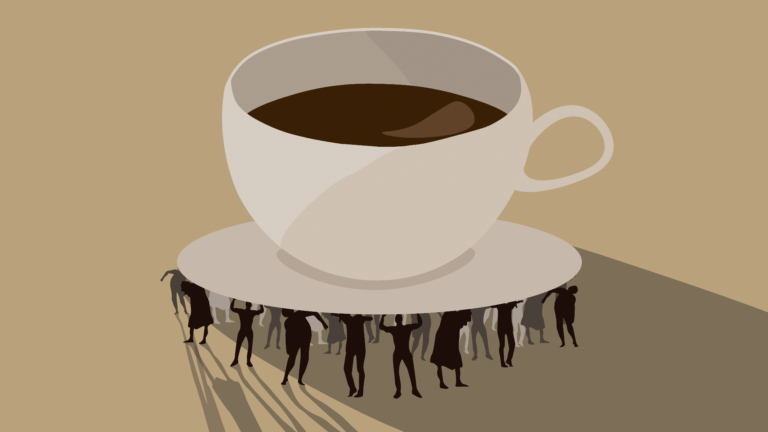
It is the 4th of July.
Armed police officers cut through the chains of large coffee plantations and break down the doors of affluent homes before storming in. Operation Rescue 2, one of Brazil’s largest rescue operations is underway.
In the weeks that follow, 50 police units free 337 people over 105 different locations.
They find people living and working in captivity, who had been lured by cynical backers. They were promised steady work and wages which they could send back to their families in the poorer areas of northern Brazil.
The captive labourers harvest coffee or sugar cane on large plantations, or are exploited as domestic workers in private homes. What they all have in common is that they are employed to work far too many hours and in undignified conditions for far too little money.
And in what authorities have called “slave-like conditions”.
77 of the slaves who were freed in July were employed to harvest coffee, one of the country’s biggest exports, in the Minas Gerais region, which produces half the country’s coffee. Coffee that is widely exported to the rest of the world for well-known coffee brands such as Lavazza, JDE and Nestle.
Evidence suggests that slave labour is a systematic problem in Minais Gerais, where more coffee is produced than anywhere else in the world. And this is a problem for the industry and what ends up in our cup, which in Denmark we drink large quantities of.
In 2016, Danwatch reported that the coffee we recognise as Nescafé, Nespresso, Gevalia and Senseo came from suppliers who bought coffee from plantations on the Dirty List.
“We are determined to solve this complex problem in close cooperation with our suppliers, who we have contacted on the issue,” Nestlé told Danwatch at the time.
Using shipping data, we followed coffee from the plantations on the government’s blacklist to the suppliers, where these coffee beans were roasted and mixed with coffee from other plantations.
Buyers like Nestle and Jacob’s Douwe Egberts, who at the time had 60 percent of the coffee market, could not guarantee that their coffee was not produced by slave labour.
And today, the problem is far from solved.
In July, once the workers are freed, a two-year trial will begin in which the prosecution will gather enough evidence to charge those responsible for the slave-like conditions. The accused parties have the right to have their case heard by at least two judicial bodies.
So it will be at least two years before the public is informed that these coffee plantations have used slave labour to harvest their coffee. Meanwhile, these plantations can continue to sell their coffee without interruption.
If charged, the culprits’ names will end up on lista suja, the Dirty List, where coffee consumers in Brazil will know to avoid buying coffee that comes from these suppliers in an effort to avoid contributing to modern slavery.
Despite this list, coffee harvested by slave labour in Brazil still may have found its way to Denmark.
The journey coffee takes is often long and opaque. Suppliers in Brazil buy from thousands of different coffee plantations and then sell this coffee on to exporters, who have customers around the world, so this ‘dirty coffee’ can also end up in Danish supermarkets.
Most of the world’s coffee still comes from Brazil’s plantations, where Operation Rescue 2 showed that slavery has not become a lesser occurrence. On the contrary, poverty has increased under President Jair Bolsonaro and the Covid19 pandemic has made it more difficult for authorities to carry out inspections.
According to Livia Miraglia, a law professor at the Universidade Federal de Minas Gerais, conditions are getting worse.
“We’re in the middle of a recession, the likes of which we haven’t seen since I was small. People see their own children starving, so they will do anything to survive,” says Livia Miraglia, who meets the slave labourers every day.
Alongside her professorship, she runs a legal clinic where four lawyers and 16 law students volunteer to take on cases on behalf of freed slave workers against their employers. Livia’s sole clinic has to cover the whole of Minas Gerais, where more than 500 slaves were freed in the first half of 2022, she says.
A somber account that reflects both a country in extreme poverty and an industry exploiting the desperate situation of its people. The poverty line in Brazil is 246 reais per month. This is equivalent to 350 Danish kroner, and in March 2021 27 million Brazilians were living below the poverty line, the highest number in more than a decade.
Paradoxically, coffee plantation profits have increased during the three years of Covid19. In Minas Gerais, coffee production reached a new record in 2020, and meanwhile authorities freed 140 workers that year who were harvesting coffee in slave-like conditions.
Last year, at the end of September, when the coffee harvest in Brazil usually ends, 240 workers were freed from coffee plantations in Brazil. There were about 70 percent more freed slaves from the coffee plantations than the year before, authorities reported.
Among them were 24 adults, including a 16-year-old girl, who was freed from Laranjeiras Farm in July 2021, wrote the Brazilian investigative media, Reporter Brasil, with who Danwatch works together with.
The owner of the coffee plantation is Job Carvalho de Brito Filho and he is a producer of specialty coffee, for which in November 2019 he won the Ilicínea Specialty Coffee contest. The inspectors found that the workers at Laranjeiras Farm had been subjected to human trafficking and slavery-like conditions.
The 24 workers had been lured from four different regions of the country and away from their families to Minas Gerais, where they lived in squalid shacks without access to toilets, beds or a proper place to eat. At night, bats circled the workers, and mice ate what little food they could afford to buy, they told authorities on 12 July 2021.
The coffee producer rejected the allegations of slave-like working conditions and said that the inspection had revealed “a few instances of non-compliance with labour laws”. Laranjeiras Farm harvested coffee for, among others, the Cocatrel cooperative, which in May 2022 informed Reporter Brasil that the plantation was suspended.
But the plantation owner was able to continue storing coffee at Cocatrel’s warehouse.
To find out if the coffee harvested by the 24 slave labourers on Laranjeiras Farm has found its way to Denmark, it is necessary to first look into who buys coffee from Laranjeiras Farm.
Trade documents, now in Danwatch’s possession, show that not only Cocatrel, but also two coffee exporters, Coopercitrus and Nucoffee (Syngenta) have bought several lots of coffee from the now accused coffee plantation.
The three coffee exporters are certified by the sustainability label UTZ/Rainforest Alliance, and Cocatrel is also Fair trade certified, which should act as a guarantee to consumers that the coffee plantation is working towards fair wages for its coffee workers.
Cocatrel has several clients who sell coffee in Denmark. Shipping documents reveal that the Italian coffee brand, Lavazza, which in Denmark belongs to the same syndicate as Merrild and has offices in Middelfart, bought coffee from Cocatrel from 2019-2021.
The German coffee giant, Jacob Douwe Egberts (JDE), which sells coffee in Denmark under the names Carat, Gevalia and Cafe Noir, bought coffee from Cocatrel in 2018-2019, as did the Swiss company Rothfos and American Sucafina, both of which are suppliers to Nestlé.
So how can Danish coffee buyers who buy from the multinationals or directly from the three cooperatives in Brazil know that there is no illegal slave labour behind their coffee beans? They can’t.
Accused plantation owner Job Carvalho de Brito Filho will not appear on the Dirty List until at least two years after the inspection by authorities. That is 2023.
The Dirty List is an important weapon in the fight against exploitation of Brazil’s poorest workers, says Jorge Ferreira dos Santos Filho. He is the head of the Articulação dos Empregados Rurais de Minas Gerais, or Adere, an organisation working for the rights of rural workers.
But the battle is being fought in a political headwind, he believes. These political winds of recent years have removed half of the inspectors carrying out inspections on plantations and deregulated labour laws for workers, depriving them of the protection they once had.
“The relaxed rules for employers and the attempt to abolish the Dirty List has created a veritable army of workers who are even more willing to work for less money and allow themselves to be taken hostage in a time of high unemployment,” says Jorge Ferreira dos Santos Filho.
If the Dirty List is not completely abolished, it will soon be kept confidential, so that the public no longer have an insight into where the slave plantations are, he fears.
“The government is still trying to deregulate the laws on slave labour in Brazil, which means politicians are trying to lessen the chances of workers being rescued from slavery, as well as trying to weaken the social groups and members of the state who are fighting this inhumane crime,” says Jorge Ferreira dos Santos Filho.
FACTS
Three international coffee buyers are relying on the Dirty List to weed out suppliers convicted of slavery in Brazilian coffee. Nothing happens to the plantations that have not yet been added to the list.
“The Lavazza Group is doing all the relevant research and evaluation on Cocatrel, which is a very marginal supplier to Lavazza, representing 1% of the total volume of coffee purchased in Brazil”.
“If one of our suppliers behaves in a manner contrary to our policies and codes of conduct, we will, after a timely and appropriate verification, implement support and corrective activities, and in the event of negative feedback, we will immediately exclude that supplier from our supply chain.”
“We are committed to eliminating forced labour and any other form of labour rights violations within our sphere of influence.
No NKG company, including Rothfos, would knowingly buy coffee produced by farms that violate human rights or local laws.”
“Our local trading partners, Nutrade and Cocatrel have assured us that they do not trade coffee coming from producers who are on the ‘Lista Suja'”.
“Vi besøger jævnl
“We regularly visit our suppliers in the field to ensure ethical working conditions are met. All our contracts contain a specific clause (among others) on forced labour, which all suppliers must agree to observe if they want to work with us.”
“We are aware that together we have to do more to solve this structural problem and we cannot do it alone.
The coffee industry, governments, NGOs and civil society must work together to tackle the problem.”
igt vores leverandører i marken for at sikre etiske arbejdsvilkår. Alle vores kontrakter indeholder en specifik klausul (blandt andet) om tvangsarbejde, som alle leverandører skal acceptere at overholde, hvis de vil arbejde med os”.
“Vi er bevidste om, at vi i fællesskab skal gøre mere for at løse dette strukturelle problem, og vi kan ikke gøre det alene. Kaffeindustrien, regeringer, ngo’er og civilsamfundet skal arbejde sammen for at tackle problemerne”.
